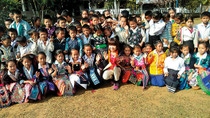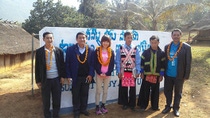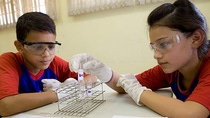Média
A chance to learn

Education is vital to sustainable development and is, officially, a human right. Yet millions of children still lack the necessary schooling to realize their potential. Japanese singer-songwriter Ai Kawashima is helping to improve this situation by building schools where they are needed.
Ai Kawashima’s story is extraordinary. She has not only risen above her own childhood tragedies to become a pop star. The 28-year-old Japanese musician has also founded an NGO with the goal of building 100 schools across the globe for children who want the chance to learn but lack the facilities.
Orphaned at the age of three, her single mother’s health having deteriorated rapidly after giving birth, she lived for a short time in an orphanage in her home city of Fukuoka, until she was adopted by the Kawashima family. She always enjoyed singing and playing music. Her adoptive parents encouraged her talents and at the age of just ten she sang a Japanese folk song on stage at New York’s Carnegie Hall.

But a few years later she lost both adoptive parents to illness. At 16, she was once again an orphan. Yet she did not allow herself the luxury of self pity. Instead, she resolved that she would make her mother’s dream come true and become a professional musician. The young teenager set off to Tokyo to start her career.
It was no easy ride. She began by performing live on the streets of the busy shopping district, Shibuya. Gradually, she started drawing crowds and gained the nickname “The Angel on the Street”. In order to raise her public profile, she set herself the target of doing 1,000 street performances.
“Those street performances were the springboard to making my debut and a very important starting point for me,” she says. It was on the streets that she met people from the record company that eventually signed her. Her breakthrough came in 2003, when she was just 17. Her first single, "Door to Tomorrow", was a hit, selling over 900,000 copies. The relationships she forged with her staff team during this time were vital to rebuilding her life. “They rallied round me and supported me with all their strength,” she says. “It’s thanks to their warmth and kindness that I was able to put it all back together a little at a time.”
Setting sights to another goal close to the heart

By 2005, she had achieved her goal of 1,000 street performances and her musical career had taken off. As a solo singer-songwriter she released several albums and singles that featured in video games and "anime" (animated films).
With this success, she was now able to set her sights on another goal close to her heart. In her teens, she became aware of the terrible problems faced by children in Africa. It made a deep impact on her. At the age of 19, she began devoting her energies to charitable education projects. “I chose school-building as a means of helping,” she says, “because I have learned a lot about the power of education from many people involved with volunteer organizations. If kids can attend school, they can grow intellectually and the doors to future employment are opened to them.”
Her first school was built in Burkina Faso in 2006. About 300 pupils attend classes there now. Another was completed in Cambodia in 2008. Other projects – involving collaborations with local partners on the ground and additional fundraising via a Japanese reality TV series – have led to school buildings being erected in Liberia, East Timor, Bangladesh and India.
Kawashima has now set herself another ambitious goal. “Since I had set myself the goal of 1,000 live street performances,” she says, “I thought, ok, let’s go for 100 schools! We’ve built seven so far and are currently building one in Laos."
80% of the costs of building each school are carried by Kawashima herself. Her team donates 10% and she encourages her fans to contribute the remainder. Before any building work is carried out, Kawashima and her staff consult with NGOs that are specialists in the field and, with their help, select the right place for each project. Kawashima provides the funding, the various NGOs are entrusted with the actual building, management and maintenance of each school.
Determined to thorough charity work

Kawashima takes great personal interest in the detailed reports they send her about the children’s circumstances. She is determined that her charity work is thorough. “I think success comes only when we have a school that never has to close its doors and can be maintained. The actual building of the school is just the foundation,” she says.
She personally attends the opening ceremonies of the new schools and is always moved by the reception she receives. “I’m given such a warm, heartfelt welcome by the school children and the staff. I’ve listened to the dreams the children have for the future. These are moments I will treasure forever,” she says.
Kawashima’s music career continues to go from strength to strength and she now has her sights set on performing at Tokyo’s huge Nippon Budōkan arena. But her goals for her charity work are no less ambitious. “I want to continue to be a chapion of education and be involved in building schools all over the world. I’ll probably set myself a new goal of 1,000 schools,” she says. “No matter how small, if I can make a difference, I’ll do everything I can to help.”
